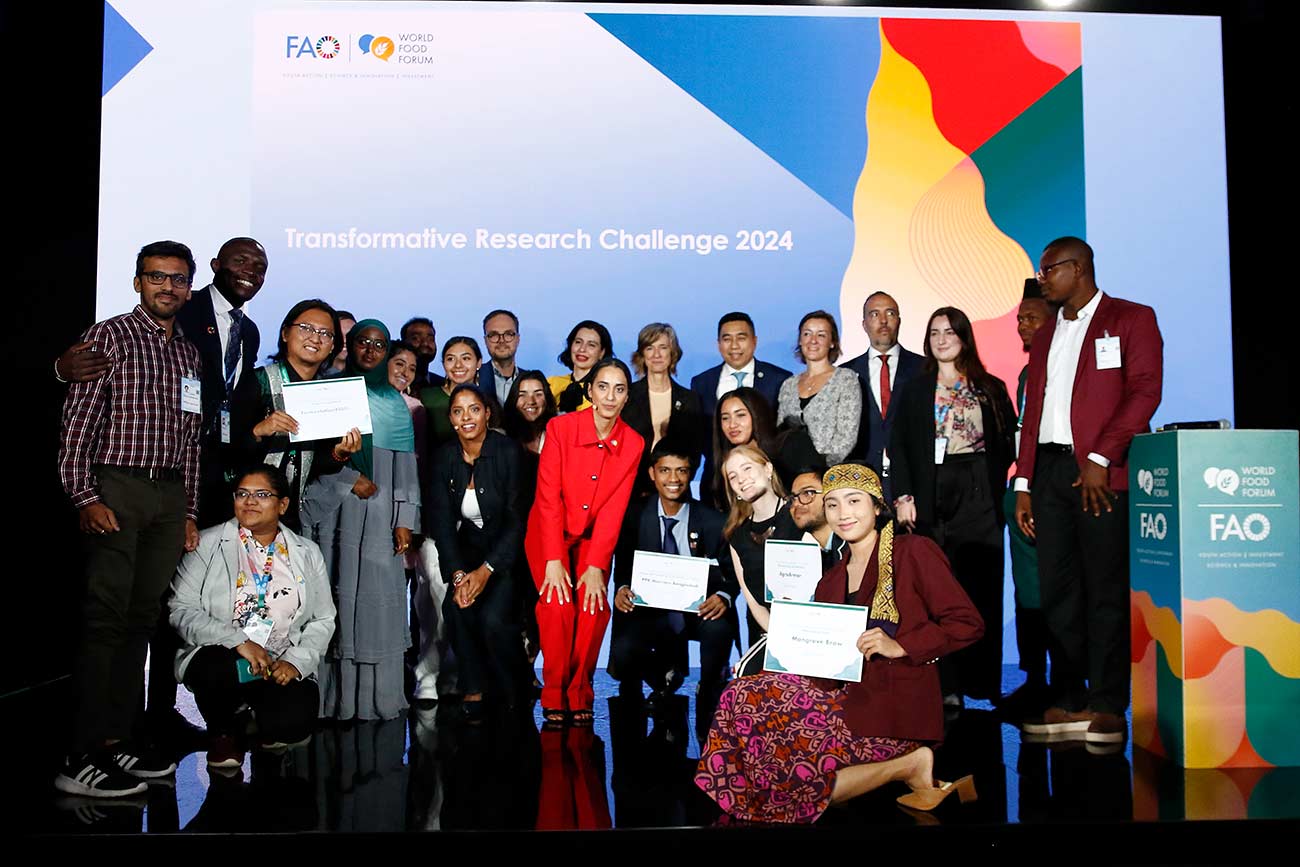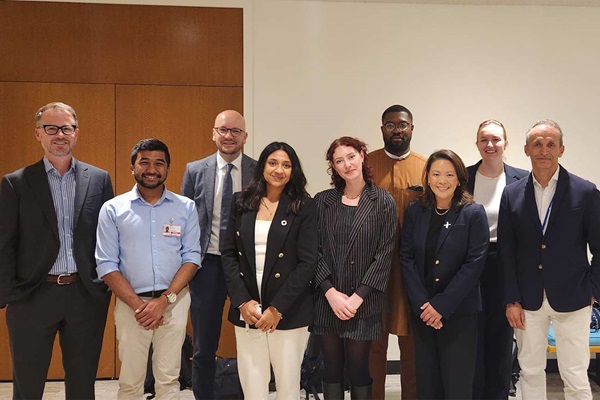Transformative
Research
Challenge

What is the Transformative Research Challenge?
The WFF Transformative Research Challenge (TRC) is a global competition designed to empower young researchers to develop innovative and impactful solutions to transform agrifood systems. Since its inception in 2021, the World Food Forum (WFF) Youth Innovation Lab has partnered with leading organizations in agrifood research and United Nations Agencies, including the Food and Agriculture Organization of the United Nations (FAO) to address critical challenges through a global platform.
The TRC supports participants to develop research proposals that lead to actionable and tangible solutions. Finalists pitch their ideas at the WFF flagship event held at FAO headquarters in Rome, Italy. Over the years, the TRC has collaborated with 18 prominent organizations, including Wageningen University and Research (WUR), the International Fund for Agricultural Development (IFAD), EIT Food and CGIAR, to covering more than prize categories on critical agrifood systems topics. Out of over 2 000 applications submitted globally, the TRC has awarded more than USD 500 000 in grants and in-kind support to 71 youth-led innovative research projects.
Applications closed on 16 May 2025.
For more information, please read the Terms and Conditions.
What are the competition phases?
Open Call for applications
Young researchers submit a two-page concept note, outlining an initial innovative research idea for one of the four prize categories.
Evaluation
Applications are reviewed by expert evaluators to select the most innovative and cutting-edge research ideas as semi-finalists.
Capacity Building
Semi-finalist teams participate in a month-long capacity development programme including masterclasses and mentorship provided by TRC knowledge partners. During this stage, semi-finalists refine their ideas into detailed research proposals.
Presentation of the finalists
After a second round of evaluation, finalist teams are selected. Successful teams are invited to pitch their final research projects at the TRC finals at the WFF flagship event in October.
What do young researchers gain?
- Research funding
Winning teams receive up to USD 10 000 in research funding to implement their research projects. In addition, one team will be selected from the winners of each TRC category as the overall winner of the 2025 Transformative Research Challenge and will be awarded an additional USD 10 000 in research funding. - Global visibility
Finalist teams receive recognition for their innovative work through the WFF website and social media channels, showcasing their projects to a global audience. - Networking opportunities
Finalist teams connect with a global network of young leaders, agrifood experts and representatives from the public and private sectors, including the United Nations. - Capacity development
Semi-finalist teams receive expert guidance to strengthen their skills in research proposal development. - Invitation to FAO headquarters
Finalist teams are invited to present their research at the TRC Finals held at FAO headquarters in Rome in October 2025, in front of a high-level jury and a global audience via live stream on a range of platforms including UN Web TV. - Post awards support
Finalists are invited to apply for the WFF Youth Food Lab incubator programme. Winning teams may also receive continued support to further develop and implement their research proposals.
Applications closed on 16 May 2025.
For more information, please read the Terms and Conditions.
2025 TRC Prizes
(Co-hosted by FAO PPR-GEP Secretariat)
Peste des Petits Ruminants (PPR) is a highly contagious viral disease that impacts small ruminants and causes significant socio-economic losses, with annual damages estimated at USD 2.1 billion across nearly 70 countries in Europe, the Middle East, Africa and Asia. Women, who make up 60% of low-income livestock keepers and play a critical role in small ruminant value chains, face systemic barriers to accessing veterinary services, training and resources essential to effective disease prevention and control. These gender-based inequities undermine women's livelihoods and hinder the eradication of PPR. This prize seeks to empower young researchers to propose transformative, gender-responsive solutions to combat PPR while addressing the unique challenges faced by women in small ruminant farming systems. By promoting innovative approaches to gender equality in livestock management, this prize aims to improve livelihoods, enhance food security and build resilience for communities impacted by PPR. Winners will receive a USD 8 000 research grant and opportunities to showcase their work through the FAO PPR Global Eradication Programme platform, as well as the WFF website and social media channels. Join us in driving change through transformative research that integrates gender mainstreaming with PPR eradication.
(Co-hosted by the FAO Land and Water Division (NSL) and the FAO Fisheries and Aquaculture Division (NFI))
Water is essential to global food security and nutrition, with agriculture accounting for over 70% of global freshwater withdrawals. Inland water bodies and river basins sustain millions of farming and fishing communities, including Indigenous Peoples who have safeguarded aquatic ecosystems for generations. However, rising water demand, climate change and ecosystem degradation intensify water scarcity, threatening food security and livelihoods worldwide. The Integrated Water Resources Management Prize empowers young innovators to develop scalable solutions that address water scarcity while promoting environmental conservation, social equity and economic resilience. Aligned with the FAO Strategic Framework (2022-2031), the FAO Blue Transformation Roadmap (2022-2030), and the United Nations Sustainable Development Goals (SDGs) 2 (Zero Hunger), 6 (Clean Water and Sanitation) and 14 (Life Below Water) the prize fosters sustainable water governance and resilient agrifood systems. Winners will receive USD 10 000 in research grants, personalized mentorship from global water management experts and access to exclusive capacity-building sessions. Additionally, they will have opportunities to connect with investors and researchers at high-profile events such as the World Food Forum flagship event. Winners will also gain global visibility through World Food Forum (WFF) Youth Initiative's social media channels and website. Take the lead in addressing one of the world's most pressing challenges by driving sustainable solutions for water management, protecting livelihoods and building a resilient future for agrifood systems.
(Co-hosted by Shanghai Ocean University and the FAO Fisheries and Aquaculture Division (NFI))
Aquaculture is the fastest-growing sector within global aquatic food systems, accounting for over 50% of the world's aquatic animal production. Despite its rapid growth and potential to contribute to global food security, the sector faces critical challenges that threaten its sustainability and endanger millions of livelihoods, including climate change, biodiversity loss and ecosystem degradation. To address these issues, the Sustainable Aquaculture Prize seeks to empower young innovators to develop scalable and accessible solutions that balance aquaculture productivity with environmental conservation, social equity and economic resilience. Winners will receive USD10 000 in research grants, personalized mentorship from global experts and access to exclusive training sessions. They will gain networking opportunities with investors, value-chain stakeholders and research institutions, including participation in the WFF flagship event and the Global Sustainable Aquaculture Advancement Partnership (GSAAP). Additionally, winners will benefit from global visibility through social media campaigns, feature articles on WFF channels and website, and access to cutting-edge resources such as SHOU laboratory facilities. Take part in the next wave of sustainable aquaculture innovation and join us in building a more resilient and equitable aquatic food system for future generations.
(Co-hosted by the FAO Forestry Division (NFO))
Forests are among the most valuable resources on Earth, supporting environmental health, social well-being and economic development. Nearly 6 billion people rely on forests for their livelihoods and essential products, while 4 billion m3 of wood is produced worldwide every year. With demand for forest products projected to rise significantly by 2050, forests face immense challenges, including deforestation, unsustainable harvesting, wildfires, pest outbreaks and climate change intensifying impacts. Addressing these challenges requires science-based and innovative solutions. The Forestry Innovation Prize recognizes youth-led, transformative solutions to address these challenges by fostering innovative, scalable and adaptable approaches to sustainable forest management. It aligns with FAO’s Strategic Framework (2022–2031), Science and Innovation Strategy, and Forestry Roadmap (2024–2031), all of which prioritize scaling scientific and evidence-based innovations to increase the forest sector’s contributions to global solutions and sustainable agrifood systems transformation.
Winners will receive USD 10 000 in research grants, networking and partnership opportunities from global forestry experts. Beyond these, they will gain opportunities to connect with forest sector professionals working in the multilateral development space as well as scientists and researchers in forest sector innovation, from institutions across regions. Winners will also benefit from global visibility and recognition, with their innovations showcased through WFF social media channels and website.
(Co-hosted by the FAO EAF-Nansen Programme and the FAO Fisheries and Aquaculture Division (NFI))
Marine ecosystems are vital for global food security, providing essential goods and services, particularly aquatic food products, and supporting the livelihoods of millions of people. However, these systems face significant threats, including excessive fishing pressure, environmental variability, climate change and pollution from marine and land-based sources. The Nansen Programme Ecosystem Approach to Fisheries Prize celebrates the 50th anniversary of the Ecosystem Approach to Fisheries (EAF)-Nansen Programme by inspiring young researchers to develop innovative and scalable solutions that enhance the adoption and implementation of the EAF. This holistic, risk-based management approach integrates ecological, social and economic dimensions to ensure the sustainability of marine ecosystems and the communities that depend on them.
The winning team, comprising two individuals, will receive the opportunity to continue their work with additional support and mentorship at FAO headquarters in Rome for a duration of 3 months fully sponsored by the EAF-Nansen Programme.
Applications closed on 16 May 2025.
For more information, please read the Terms and Conditions.
Transformative Research in Action
Watch the TRC finals in:





-2023-winners.tmb-th600x400.jpg?Culture=en&sfvrsn=3e5d4076_1)
